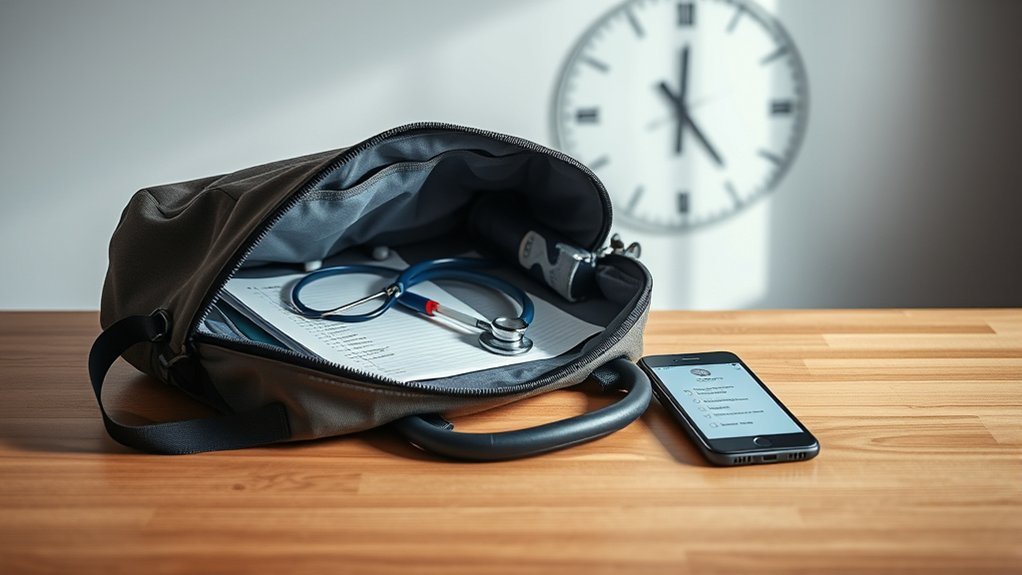As you prepare your hospital bag, it’s essential to know when to call your doctor. Recognizing the early signs of labor can make a significant difference in your experience. If you notice changes like increased contractions or unusual discharge, it’s time to reach out. Understanding these signals is key, but there’s more you need to be aware of to guarantee you and your baby stay safe during this critical time.
Recognizing Early Signs of Labor

Recognizing the early signs of labor is essential for expectant mothers, as it helps guarantee a timely response when it’s time to head to the hospital.
You might notice an increase in Braxton Hicks contractions, which can become more frequent and intense. Additionally, look for changes in vaginal discharge, such as a mucous plug or a bloody show.
Your water breaking is another significant indicator that labor may be imminent. Pay attention to lower back pain or pressure in your pelvis, as these sensations often signal the onset of labor.
It’s important to trust your instincts; if you feel something isn’t right, don’t hesitate to contact your healthcare provider for guidance.
Being prepared can make all the difference in your birthing experience.
Understanding Contractions and Their Timing

Understanding the timing and nature of contractions is essential for maneuvering the labor process. You’ll typically experience contractions as rhythmic tightening and relaxing of your uterus.
To monitor them, note the duration and frequency. A common guideline is the “5-1-1 rule”: contractions that last about one minute, occurring five minutes apart, for at least one hour indicate it’s time to head to the hospital.
Monitor contraction duration and frequency using the “5-1-1 rule” to determine when to go to the hospital.
However, every individual may have a different experience, so trust your instincts. If you’re unsure, don’t hesitate to call your healthcare provider for guidance.
Keeping a contraction log can help you track their patterns effectively, ensuring you’re prepared when the time comes to seek medical assistance.
Identifying Potential Complications

While labor can be an exciting time, it’s important to be aware of potential complications that may arise. Keep an eye out for signs like heavy bleeding, severe abdominal pain, or persistent headaches, as these may indicate serious issues.
If you experience a sudden decrease in fetal movement or if your water breaks but labor doesn’t start promptly, contact your healthcare provider. Additionally, be alert to any signs of infection, such as fever or chills.
It’s vital to trust your instincts; if something feels off, don’t hesitate to call your doctor. Early intervention can be key to ensuring both your safety and your baby’s well-being during this critical time.
Always prioritize open communication with your healthcare team.
Monitoring Your Baby’s Movement
As you approach labor, keeping track of your baby’s movements becomes essential for monitoring their well-being. Regular movement typically indicates that your baby is healthy, while a noticeable decrease may signal potential issues.
You should aim to feel at least ten movements within a two-hour period. Establishing a routine can help you recognize what’s normal for your baby; some may be more active during specific times of the day.
If you notice a significant change in their movement patterns, don’t hesitate to reach out to your healthcare provider. They’ll guide you on whether further evaluation is necessary.
Knowing When to Seek Immediate Help
Knowing when to seek immediate help during your pregnancy can be essential for both your well-being and that of your baby.
If you experience severe abdominal pain, heavy bleeding, or sudden swelling, don’t hesitate to contact your healthcare provider.
Additionally, if you notice a significant decrease in your baby’s movements or if you experience consistent contractions before your due date, it’s important to seek assistance.
Other warning signs include severe headaches, vision changes, or signs of preterm labor.
Trust your instincts; if something feels off, reach out for guidance.
Remember, it’s always better to err on the side of caution when it comes to your health and your baby’s safety.
Your healthcare team is there to support you.
Frequently Asked Questions
What Items Should I Pack in My Hospital Bag?
You should pack essentials like comfortable clothing, toiletries, snacks, your phone charger, and important documents. Don’t forget items for the baby, such as outfits, blankets, and a car seat to guarantee a smooth changeover home.
How Do I Know if It’s False Labor?
You’ll know it’s false labor if contractions are irregular and don’t intensify. Picture waves gently lapping at the shore, then receding. If you can walk or talk through them, relax; it’s likely not the real deal.
Can I Eat or Drink During Labor?
During labor, you can eat or drink, but it’s best to check with your healthcare provider first. They may recommend clear fluids for energy or restrict food depending on your specific situation and any potential interventions.
Should I Bring My Birth Plan to the Hospital?
Bringing your birth plan to the hospital’s like packing a map for a road trip. It guides your care team, ensuring they understand your preferences. Just remember, flexibility’s key—things might change during your journey.
What Comfort Measures Can I Use During Labor?
During labor, you can use breathing techniques, massage, warm baths, and position changes for comfort. Staying hydrated and having a supportive partner can also enhance your experience and help manage pain effectively.
Conclusion
In the journey of parenthood, knowing when to call your doctor can be a lifeline. If you notice significant changes in your body or your baby’s movements, don’t ignore those signals. After all, your instincts are a powerful tool in ensuring a safe delivery. By staying informed and proactive, you’re not just preparing a hospital bag; you’re embracing the first steps into a new chapter of your life. Trust yourself—your baby’s health depends on it.
